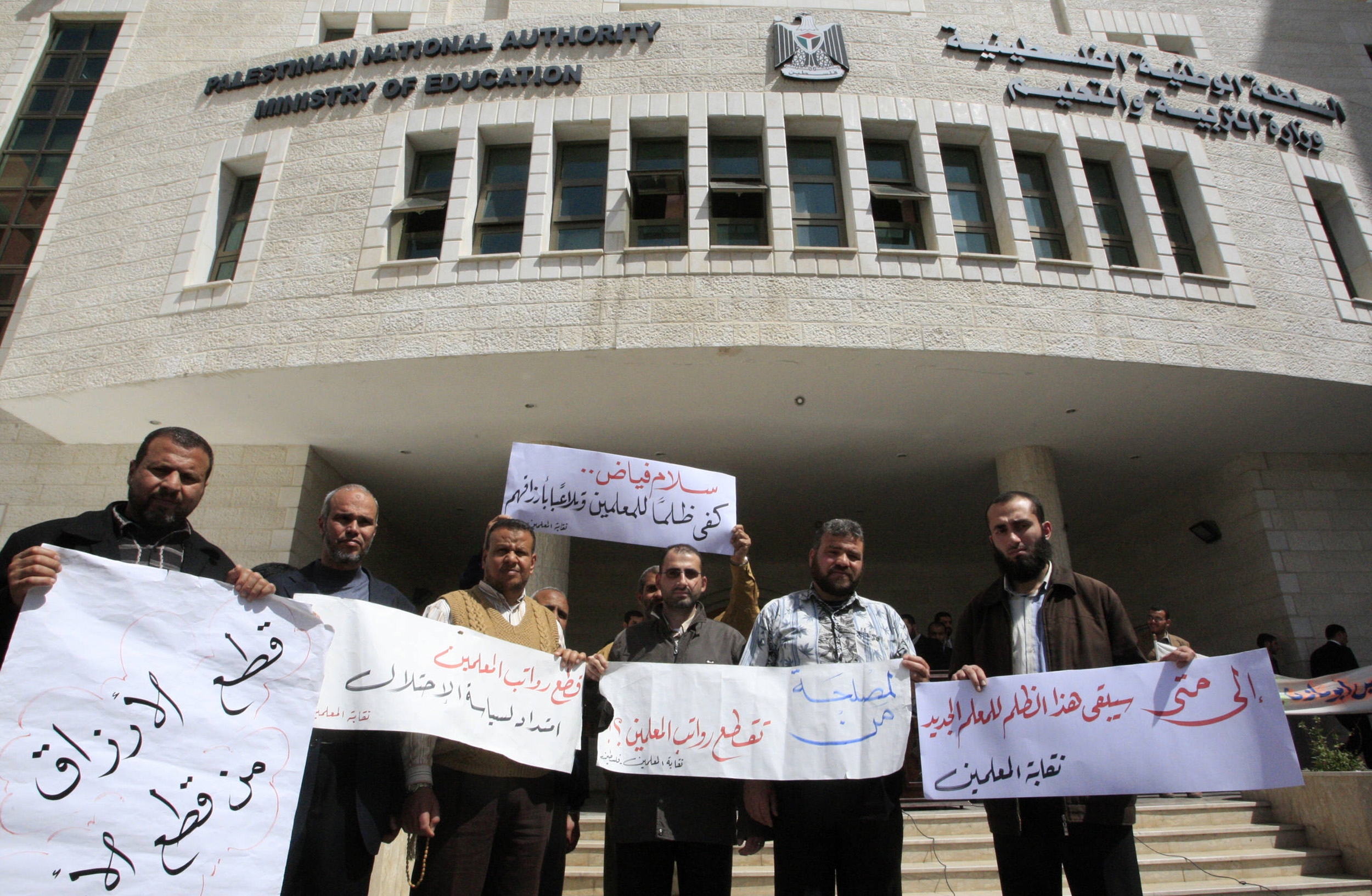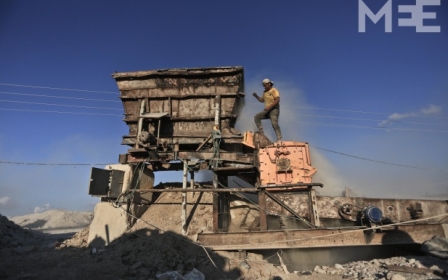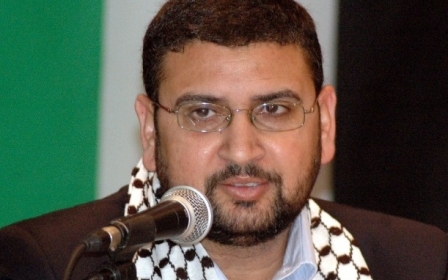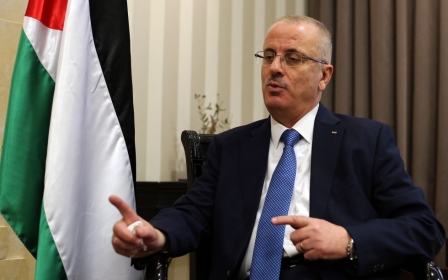All work but no pay in Gaza

DEIR EL-BALAH, Gaza City - At 5:45 am every morning, Abdullah Quffah’s alarm used to go off, kicking off his busy routine.
Despite the early start, he always had to rush and only had a short window to turn himself around, grab his bags and books and get on the first public transport he could find - all just so he could get to school before his students.
Over the past few years, his cellphone alarm become such part of daily life that the 32-year-old teacher even got used to the early starts.
This routine, however, is now at risk. For two days last week, Gaza’s teachers went on strike to protest the non-payment of wages. This strike then resumed on Sunday, with teachers only working part time for the last three days.
On Wednesday, the partial strike will end, and the teachers will decide whether to go back to work, carry on working part time, or hold another full time strike. Few want to be in this position, but most seem to feel that they have been given no other options.
“For the past year, I have received no salary for my work as a teacher,” said Quffah who works at one of Gaza City’s most famous secondary schools, al-Karmel.
“The government owe me about $5,000 in back pay. This should be enough to pay off my debts, and cover my daily needs. But until that is paid, having my salary cut has meant that I am cut off from all aspects of life.”
Quffah is just one of some 50,000 government workers in Gaza who have not been paid their wages despite going to work regularly.
On Tuesday, it was announced that a much-needed $1,000 payment would be made to the workers, but the move is controversial.
Mohammed Siam, the President of Syndicate of Public Employees in Gaza, said that his syndicate regarded the gesture as “humanitarian aid” rather than legitimate back pay.
The money will be collected from the Social Affairs ministry, which is responsible for making payments to widows and orphans, and might be regarded as offensive by many hard-working people who see it as charity and is not an admission by the PA that the workers deserve to be paid, he explained.
"This is unacceptable from our side,” Siam told MEE. “We will not reject it, but we warn that such payment comes from outside of the Palestinian Authority budget.
“We demand from President [Mahmoud Abbas] make this part of the salaries due to all employees.
"We consider this not enough, because only 24,000 out of 43,000 staff members will be paid and the rest will not get payment. Plus, the 10,000 employees on short-term contract will not get paid at all.”
The controversy goes back to 2007, when Hamas won control of Gaza and Fatah in response told its public sector employees – from teachers to ministry employees and border guards - to go home in a bid to undermine the new authorities.
Over time, new workers were hired to replace the old but the old continued to receive payment regardless.
The situation has been contentions for years but has come to a head this year, as budgetary restraints have led to workers hired after 2007 having their wages withheld, while most civil servants hired pre-2007 continued to be paid by the PA and its international donors, despite the fact they had not worked for years.
An Arabic teacher, who works with Quffah but did not want to give his name told to MEE that the sense of injustice was even more depressing than the lack of payments.
“The teachers that work are unpaid, but those who were ordered to sit at sit home are being paid and even promoted for obeying orders to just sit at home,” he said.
“It’s a case of sleep next to your wife and get paid - it is as simple as that.”
Daily impact
The pay dispute has had a crippling impact on Gaza and left many struggling to cope.
When Quffah was studying Information Technology at a Gaza-based university, his dream was to become a teacher. He wanted to share something with his community, and felt he had the charisma and attitude to do the job well. Having completed his studies, in 2009 Quffah responded to a Palestinian Ministry of Education call for new teachers to enroll for the new school year.
At first he was excited about the difference he could make and felt he could be an example to the children. He would always arrive at work well presented and ready for the busy day ahead.
These days, however, the story is quite different. Quffah doesn’t even have the money to buy himself a sandwich at lunch and has to watch his students eating, while he goes hungry.
His clothes have become old and he often has to wear the same clothes a few days in a row because he cannot replace old shirts and trousers.
“This makes me feel ashamed of myself, but what can I do?” Quffah said.
“We are teachers, with nothing to do with politics, militarism or factionalism. Our job is humanitarian and we should not be targeted in this way.”
On top of the difficulty involved in just getting bread and butter on the table, there are also still bills to pay and family chores and demands to adhere to.
Quffah’s wife often asks him to pick up simple supplies, like milk and diapers for his two daughters, but in the last few weeks Quffah has begun running out of supermarkets he can get credit in.
While he has supported himself for the last few months by taking debts from supermarkets, pharmacies and groceries, the good will has begun to run out.
For a while he got around the issue by visiting lots of different shops to spread around his debts, but even this tactic is no longer working.
“I buy foodstuff on credit and tell supermarket owners to wait for next month,” he said.
“But some of these supermarkets have been waiting since last January. This makes me reflect on my image, and what people think of me. Now, when I walk in the streets I try to avoid places where I have taken credit.”
His cooking gas supplier has had enough and will no longer fill the gas cylinder unless he is paid upfront.
His landlord has also grown increasingly impatient, and Quffah’s argument that once he gets paid he will more than be able to cover his debts is starting to fall flat.
Even getting to work has become difficult.
Everyday Quffah borrows 10 NIS ($2.6) from his friends to take public transport - but at some stage, he knows that he will no longer be able to ask the same friends for tomorrow’s transportation.
“This makes me feel ashamed of myself, but what can I do?” he asked.
This month, a relative donated $20 for Quffah to buy medication for himself, but he decided that his health could wait and that his students could not. He spent the money on getting to school instead, which is at least a 30 minute daily commute from his home in Deir al-Balah in central Gaza and Gaza City to the north.
Yesterday, Quffah got stuck in Gaza City. Despite the $20 donation to get to school, he spent some of the cash on diapers for his daughter. What was left, wasn’t enough to get him back home, so he had to wait for a familiar face to get a ride home. One of his colleagues walks for two hours each way to get to school, but Quffah’s journey would be even longer.
This morning, he felt he had no choice and sent a message to headmaster telling him: “I am sorry, I can’t come today. I can’t afford paying for public transport.”
Broken Promises
When the consensus technocrat government was agreed by Hamas and Fatah last June, it promised that it would look into paying out backdated pay, and getting people back into work.
At the time Quffah and many of his colleagues felt fairly optimistic, but now with several months of inaction poisoning the well, they are beginning to change their minds.
To make matters worse, last week, President Mahmoud Abbas told Egyptian television that the salaries had not been legally authorised and that even if they could be approved, his government had no money to pay them.
The Union of Public Employees in Gaza has responded to these kinds of statements by calling for further strike action, and if full time strikes happen this week and next, they are expected to last for days unless a solution can be found.
Until it is, however, Quffah worries that his students, as well as his fellow teachers, will keep suffering and that with more strikes likely around the corner – few will be able to finish this year’s curriculum in time.
New MEE newsletter: Jerusalem Dispatch
Sign up to get the latest insights and analysis on Israel-Palestine, alongside Turkey Unpacked and other MEE newsletters
Middle East Eye delivers independent and unrivalled coverage and analysis of the Middle East, North Africa and beyond. To learn more about republishing this content and the associated fees, please fill out this form. More about MEE can be found here.




